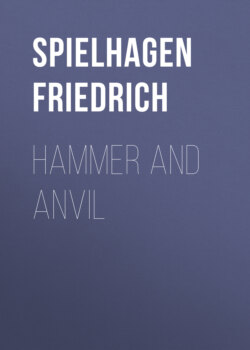Читать книгу Hammer and Anvil - Spielhagen Friedrich - Страница 6
На сайте Литреса книга снята с продажи.
CRITICAL NOTICES.
ОглавлениеTable of Contents
"Such a novel as no English author with whom we are acquainted could have written, and no American author except Hawthorne. What separates it from the multitude of American and English novels is the perfection of its plot, and its author's insight into the souls of his characters. … If Germany is poorer than England, as regards the number of its novelists, it is richer when we consider the intellectual value of their works. If it has not produced a Thackeray, or a Dickens, it has produced, we venture to think, two writers who are equal to them in genius, and superior to them in the depth and spirituality of their art--Auerbach and Spielhagen."--Putnam's Magazine.
"The name is suggested by a passage nn Goethe, which serves as a motto to the book. Spielhagen means to illustrate what Goethe speaks of--natures not in full possession of themselves, 'who are not equal to any situation in life, and whom no situation satisfies'--the Hamlet of our latest civilization. With these he deals in a poetic, ideal fashion, yet also with humor, and, what is less to be expected in a German, with sparkling, flashing wit, and a cynical vein that reminds one of Heine. He has none of the tiresome detail of Auerbach, while he lacks somewhat that excellent man's profound devotion to the moral sentiment. There is more depth of passion and of thought in Spielhagen, together with a French liveliness by no means common in German novelists. … At any rate, they are vastly superior to the bulk of English novels which are annually poured out upon us--as much above Trollope's as Steinberger Cabinet is better than London porter.--Springfield Republican.
"The reader lives among them (the characters) as he does among his acquaintances, and may plead each one's case as plausibly to his own judgment as he can those of the men whose mixed motives and actions he sees around him. In other words, these characters live, they are men and women, and the whole mystery of humanity is upon each of them. Has no superior in German romance for its enthusiastic and lively descriptions, and for the dignity and the tenderness with which its leading characters are invested."--New York Evening Post.
"He strikes with a blow like a blacksmith, making the sparks fly and the anvil ring. Terse, pointed, brilliant, rapid, and no dreamer, he has the best traits of the French manner, while in earnestness and fulness of matter he is thoroughly German. One sees, moreover, in his pages, how powerful is the impression which America has of late been making upon the mind of Europe."--Boston Commonwealth.
"The work is one of immense vigor; the characters are extraordinary, yet not unnatural; the plot is the sequence of an admirably-sustained web of incident and action. The portraitures of characteristic foibles and peculiarities remind one much of the masterhand of the great Thackeray. The author Spielhagen In Germany ranks very much as Thackeray does with us, and many of his English reviewers place him at the head and front of German novelists."--Troy Daily Times.
"His characters have, perhaps, more passion, and act their parts with as much dramatic effect as those which have passed under the hand of Auerbach."--Cincinnati Chronicle.
The N. Y. Times, of Oct. 23d, in a long Review of the above two works, says: "The descriptions of nature and art, the portrayals of character and emotion, are always striking and truthful. As one reads, there grows upon him gradually the conviction that this is one of the greatest of works of fiction. … No one, that is not a pure egoiste, can read Problematic Characters without profound and even solemn interest. It is altogether a tragic work, the tragedy of the nineteenth century--greater in its truth and earnestness, and absence of Hugoese affectation, than any tragedy the century has produced. It stands far above any of the productions of either Freytag or Auerbach."
